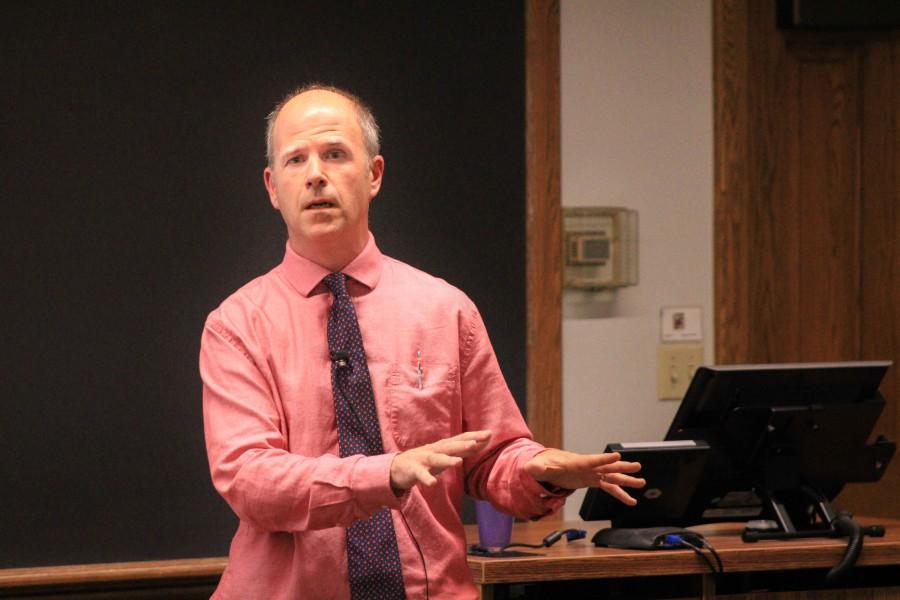The poor of ‘1984’
Sep 21, 2015
“What you see running consistently throughout Orwell’s work is this idea that modern capitalist societies … are deliberately structured to keep the poor out of our sight,” said James M. Lang, professor of English at Assumption College in Massachusetts, in a lecture Friday.
The lecture, “The Poor of ‘1984’: The Roots of George Orwell’s Final Novel,” was part of UNI’s annual conference on ethics in higher education. Some 40 faculty members, community members and students attended the discussion in Seerley Hall.
Throughout the talk, Lang outlined what he saw to be an overlooked theme of George Orwell’s body of work: the invisibility of the poor. He said with the popularity of books like “Animal Farm” and “1984” the lens that is applied to them, and to Orwell — namely that Orwell was a harsh critic of communism nd of the surveillance state — becomes ubiquitous.
But Lang stressed that Orwell, being a lifelong democratic socialist, was very concerned with “paying attention to how we pay attention to the poor” and was very critical of the influence of big business in hiding the plight of the poor.
“This topic is very interesting given the current political climate,” said provost Jim Wohlpart in his introduction of Lang. “Especially given that two of the leading Republican candidates are business people.”
Orwell, formerly Eric Blair, was born into a middle to upper-middle class family but shed those connections in his 20s (symbolized in the name change), immersing himself in living in poverty in order to write about it.
Lang traced the development of this theme throughout Orwell’s corpus, beginning with his first full-length work, “Down and Out in Paris and London.” His body of work included writings on the conditions of hospitals for the poor (which Orwell frequented due to lung problems), the ways in which those in poverty are invisible in death and pernicious economic policies that ignore the poor in order to exploit them. Lang saw the latter as particularly relevant today.
“Even today, we are taking invisible people and pushing them to other continents,” said Lang of the ways in which globalization distances us from those who create our goods (e.g., the clothes we wear). “It’s not that we are literally taking them and moving them [to other continents] … but we want a whole ocean between ourselves and our goods and the people who are doing this essential work for us.”
“The fact that we don’t see poor people is a huge issue,” said Craig Van Sandt, associate professor of management and host of the lecture. “We basically end up making policies for the top 10 or 20 percent and neglecting everybody else.”
The connection to business ethics, given that Van Sandt occupies the David W. Wilson Chair in Business Ethics, seemed loose in the traditional way one thinks of ethics in business — insider trading, etc. — but Van Sandt characterized it as more macro-level commentary on ethics in business.
“We as a society ought to be thinking about what we want from business,” Van Sandt said. “Right now what we’ve told business is, ‘we want you to make money.’ That’s about the only thing we’ve done.”
“That would be like me telling you as a student in algebra, ‘I want you to get the right answer. I don’t care how you do it … but I just want you to get the right answer,’” Van Sandt said.
He said he hoped the discussion would get people to think about how “we obviously need more from business.”
Chris Pollpeter, senior supply chain management major, attended the discussion to possibly gain some insight for a thesis he’s writing on business ethics. He said the connection to literature makes sense, because literature is a commentary on how society works, and in a capitalist society, business is a social institution.
“I think it’s almost impossible to take business out of literature and literature out of business,” Pollpeter said. “They’re both too essential to take out or to ignore.”
Lang said education can open one’s eyes to the poor, and immersing oneself in that experience is the solution. He said it is the duty of higher education to accomplish this.
“We want to make sure that our students don’t forget that not everyone has the kinds of privileges we have,” Lang said.
In the Q&A portion of the discussion, it was clear that many in the audience were skeptical of immersion as a solution in itself.
“I’m concerned that it’s not really dealing with what it is we’re doing as a society when we want to take from people what we need, and we profit and they do not,” said an audience member.
Lang conceded that one way of seeing immersive experiences is that of “poverty tourism,” and he said he had had that concern originally as well. But he changed his mind.
He said the way for people to truly open their eyes and see marginalized people in a particular way is to learn through the experience rather than “simply listening to a lecture about it.” Lang said that “good writing and film” can be an entry point, though.
“It’s not just about seeing them … we do want something to happen as a result of that seeing, “ Lang said.









